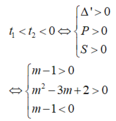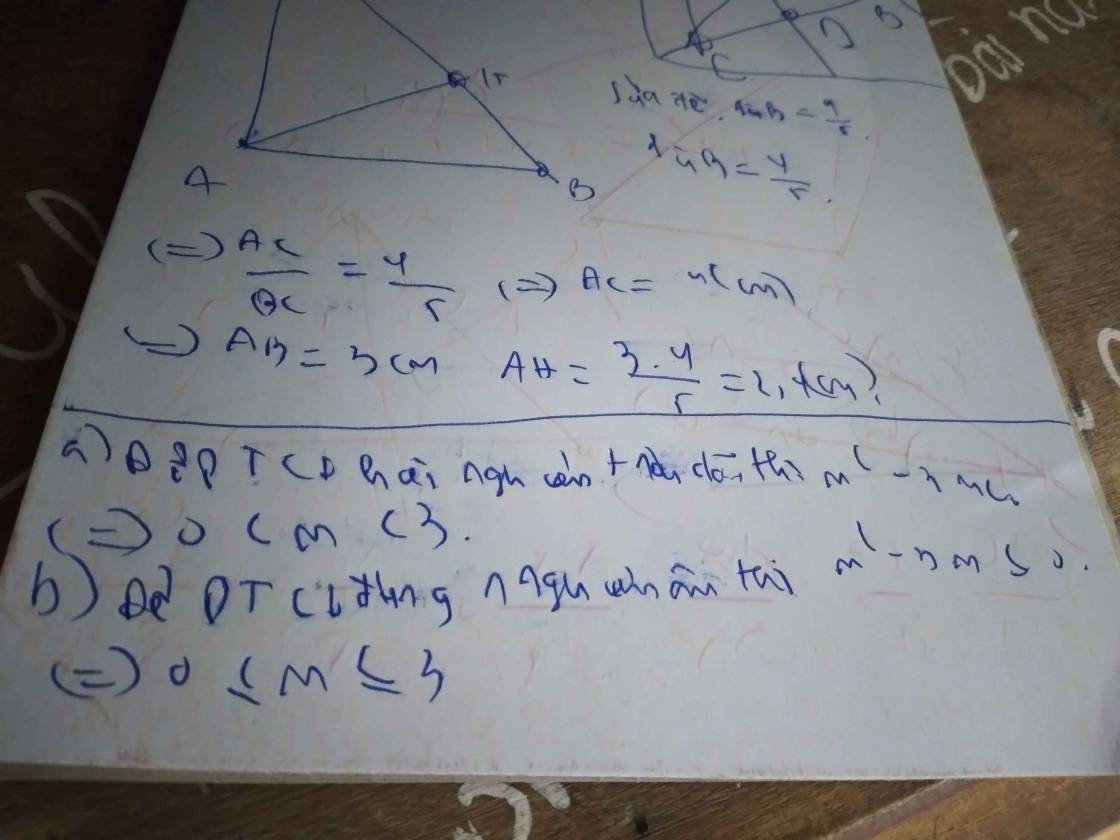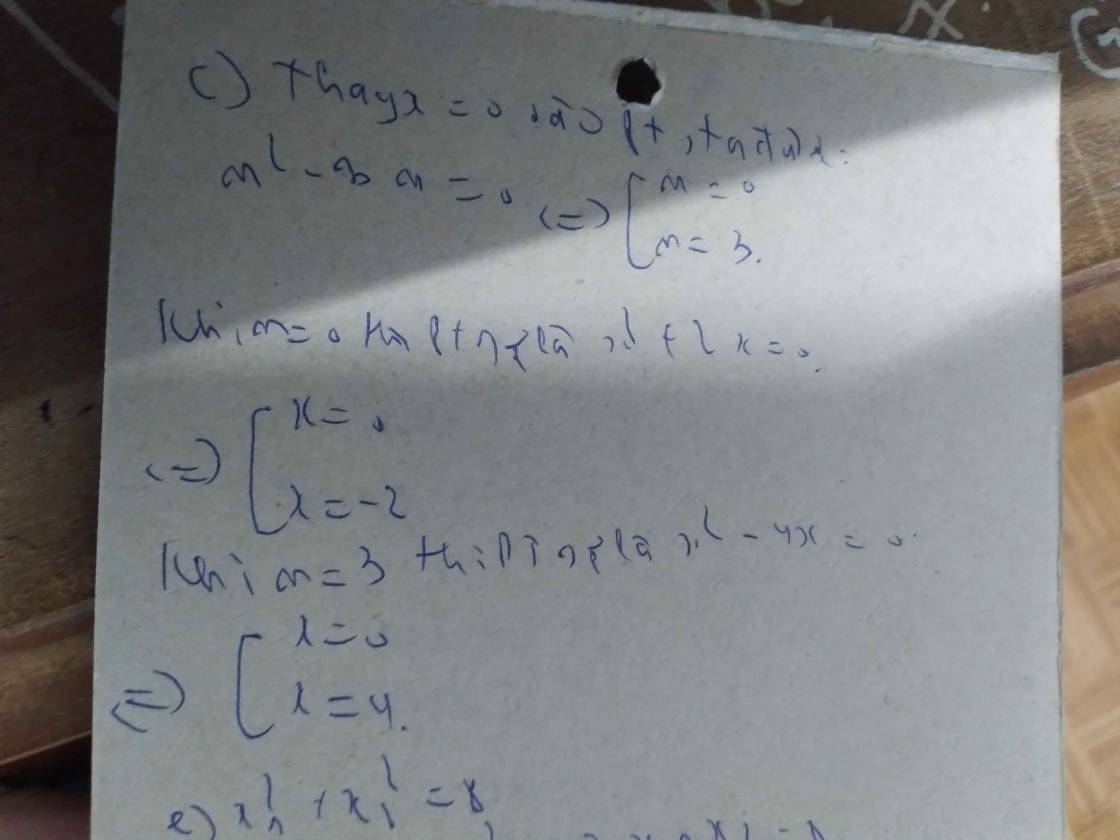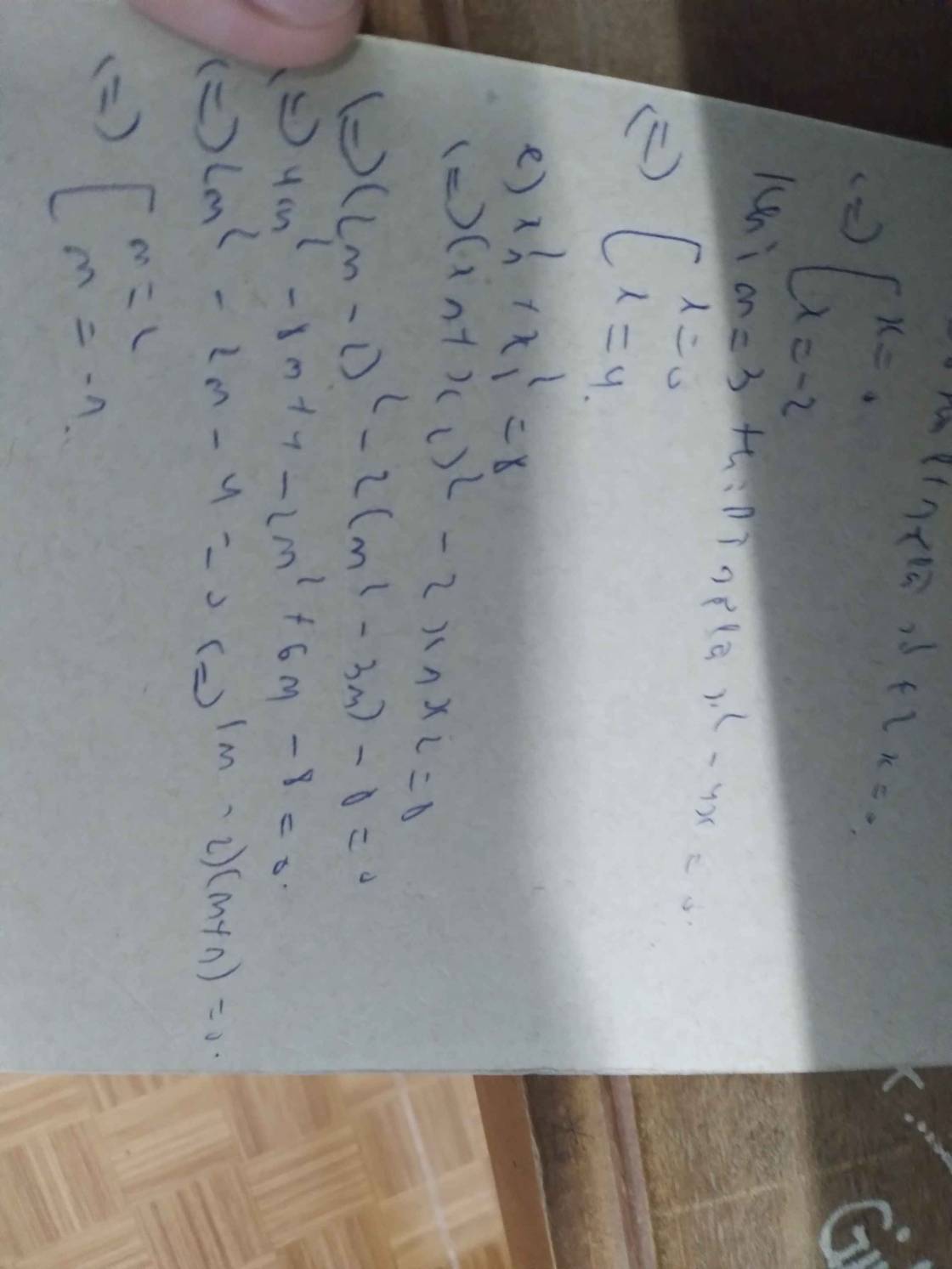Tìm m để PT x2 - 2x = m2 - 1 có nghiệm
Hãy nhập câu hỏi của bạn vào đây, nếu là tài khoản VIP, bạn sẽ được ưu tiên trả lời.


Bài 1:
a, Thay m=-1 vào (1) ta có:
\(x^2-2\left(-1+1\right)x+\left(-1\right)^2+7=0\\
\Leftrightarrow x^2+1+7=0\\
\Leftrightarrow x^2+8=0\left(vô.lí\right)\)
Thay m=3 vào (1) ta có:
\(x^2-2\left(3+1\right)x+3^2+7=0\\ \Leftrightarrow x^2-2.4x+9+7=0\\ \Leftrightarrow x^2-8x+16=0\\ \Leftrightarrow\left(x-4\right)^2=0\\ \Leftrightarrow x-4=0\\ \Leftrightarrow x=4\)
b, Thay x=4 vào (1) ta có:
\(4^2-2\left(m+1\right).4+m^2+7=0\\ \Leftrightarrow16-8\left(m+1\right)+m^2+7=0\\ \Leftrightarrow m^2+23-8m-8=0\\ \Leftrightarrow m^2-8m+15=0\\ \Leftrightarrow\left(m^2-3m\right)-\left(5m-15\right)=0\\ \Leftrightarrow m\left(m-3\right)-5\left(m-3\right)=0\\ \Leftrightarrow\left(m-3\right)\left(m-5\right)=0\\ \Leftrightarrow\left[{}\begin{matrix}m=3\\m=5\end{matrix}\right.\)
c, \(\Delta'=\left[-\left(m+1\right)\right]^2-\left(m^2+7\right)=m^2+2m+1-m^2-7=2m-6\)
Để pt có 2 nghiệm thì \(\Delta'\ge0\Leftrightarrow2m-6\ge0\Leftrightarrow m\ge3\)
Theo Vi-ét:\(\left\{{}\begin{matrix}x_1+x_2=2m+2\\x_1x_2=m^2+7\end{matrix}\right.\)
\(x_1^2+x_2^2=0\\ \Leftrightarrow\left(x_1+x_2\right)^2-2x_1x_2=0\\ \Leftrightarrow\left(2m+2\right)^2-2\left(m^2+7\right)=0\\ \Leftrightarrow4m^2+8m+4-2m^2-14=0\\ \Leftrightarrow2m^2+8m-10=0\\ \Leftrightarrow\left[{}\begin{matrix}m=1\left(ktm\right)\\m=-5\left(ktm\right)\end{matrix}\right.\)
\(x_1-x_2=0\\ \Leftrightarrow\left(x_1-x_2\right)^2=0\\ \Leftrightarrow\left(x_1+x_2\right)^2-4x_1x_2=0\\ \Leftrightarrow\left(2m+2\right)^2-4\left(m^2+7\right)=0\\ \Leftrightarrow4m^2+8m+4-4m^2-28=0\\ \Leftrightarrow8m=28=0\\ \Leftrightarrow m=\dfrac{7}{2}\left(tm\right)\)
Bài 2:
a,Thay m=-2 vào (1) ta có:
\(x^2-2x-\left(-2\right)^2-4=0\\ \Leftrightarrow x^2-2x-4-4=0\\ \Leftrightarrow x^2-2x-8=0\\ \Leftrightarrow\left[{}\begin{matrix}x=4\\x=-2\end{matrix}\right.\)
b, \(\Delta'=\left(-m\right)^2-\left(-m^2-4\right)\ge0=m^2+m^2+4=2m^2+4>0\)
Suy ra pt luôn có 2 nghiệm phân biệt
Theo Vi-ét:\(\left\{{}\begin{matrix}x_1+x_2=2\\x_1x_2=-m^2-4\end{matrix}\right.\)
\(x_1^2+x_2^2=20\\ \Leftrightarrow\left(x_1+x_2\right)^2-2x_1x_2=20\\ \Leftrightarrow2^2-2\left(-m^2-4\right)=20\\ \Leftrightarrow4+2m^2+8-20=0\\ \Leftrightarrow2m^2-8=0\\ \Leftrightarrow m=\pm2\)
\(x_1^3+x_2^3=56\\ \Leftrightarrow\left(x_1+x_2\right)^3-3x_1x_2\left(x_1+x_2\right)=56\\ \Leftrightarrow2^3-3\left(-m^2-4\right).2=56\\ \Leftrightarrow8-6\left(-m^2-4\right)-56\\ =0\\ \Leftrightarrow8+6m^2+24-56=0\\ \Leftrightarrow6m^2-24=0\\ \Leftrightarrow m=\pm2\)
\(x_1-x_2=10\\ \Leftrightarrow\left(x_1-x_2\right)^2=100\\ \Leftrightarrow\left(x_1+x_2\right)^2-4x_1x_2-100=0\\ \Leftrightarrow2^2-4\left(-m^2-4\right)-100=0\\ \Leftrightarrow4+4m^2+16-100=0\\ \Leftrightarrow4m^2-80=0\\ \Leftrightarrow m=\pm2\sqrt{5}\)

\(\Delta'=1+m^2-1=m^2>0\Rightarrow\) pt có 2 nghiệm pb khi \(m\ne0\)
Theo hệ thức Viet: \(\left\{{}\begin{matrix}x_1+x_2=2\\x_1x_2=-m^2+1\end{matrix}\right.\)
Do \(x_1\) là nghiệm của pt nên:
\(x_1^2-2x_1-m^2+1=0\Rightarrow x_1^3-2x_1^2-m^2x_1+x_1=0\)
\(\Rightarrow x_1^3-2x_1^2-m^2x_1=-x_1\)
Thế vào bài toán:
\(\left(2x_1-x_2\right)\left(-x_1+2x_2\right)=-3\)
\(\Leftrightarrow-2x_1^2-2x_2^2+5x_1x_2=-3\)
\(\Leftrightarrow-2\left(x_1+x_2\right)^2+9x_1x_2=-3\)
\(\Leftrightarrow-8+9\left(-m^2+1\right)=-3\)
\(\Leftrightarrow m^2=\dfrac{4}{9}\Rightarrow m=\pm\dfrac{2}{3}\)

Bạn nên viết đề bằng công thức toán (biểu tượng $\sum$ bên trái khung soạn thảo) để được hỗ trợ tốt hơn.

Chọn C
Đặt t= x-1 hay x= t+1, thay vào pt đã cho ta được pt:
t2+ 2(1-m) t+ m2- 3 m+2= 0 (2)
pt (1) có 2 nghiệm thỏa mãn x1< 1< x2 khi và chỉ khi pt (2) có 2 nghiệm: t1< 0 < t2 suy ra P < 0
Hay m2- 3m+ 2 < 0
Do đó: 1 < m < 2
Kết luận: với 1< m< 2 thì pt (1) có hai nghiệm x1< 1< x2

Chọn D
Đặt t= x-1 hay x= t+1, thay vào pt đã cho ta được pt:
t2+ 2(1-m) t+ m2- 3 m+2= 0 (2)
pt (1) có 2 nghiệm thỏa x1< x2< 1 khi và chỉ khi pt (2) có 2 nghiệm:

(vô nghiệm)
Kết luận: không tồn tại m thỏa mãn bài toán.

a,để pt có nghiệm kép
\(\Delta=m^2-\left(m^2-m+1\right)=m-1=0\Leftrightarrow m=1\)
\(x_1=x_2=\dfrac{2m}{2}=m=1\)
b, để pt có nghiệm \(m\ge1\)
c, Ta có \(\left(x_1+x_2\right)^2-4x_1x_2=6\)
Thay vào ta đc \(4m^2-4\left(m^2-m+1\right)=6\)
\(\Leftrightarrow4m=10\Leftrightarrow m=\dfrac{5}{2}\left(tm\right)\)

Thay x=5 vào pt, ta được:
25-10(m+1)+m^2-4m+5=0
=>m^2-4m+30-10m-10=0
=>m^2-14m+20=0
=>\(m=7\pm\sqrt{29}\)
x1+x2=(2m+2)
=>x2+5=16+2 căn 29 hoặc x2+5=16-2 căn 29
=>x2=11+2căn 29 hoặc x2=11-2 căn 29

Chọn D
Đặt t= x-1 hay x= t+1, thay vào pt đã cho ta được pt:
t2+ 2(1-m) t+ m2- 3 m+2= 0 (2)
Để pt (1) có nghiệm x≤ 1 khi và chỉ khi pt (2) có nghiệm t≤ 0
TH1: Pt(2) có nghiệm : t1≤ 0 ≤ t2
Khi đó; P= t1.t2 ≤0 hay m2- 3m+ 2≤ 0 hay 1≤ m ≤ 2
TH2: pt (2) có nghiệm

Kết luận: với 1≤ m≤ 2 thì pt (1) có nghiệm x≤1

b, Để phương trình có 2 nghiệm \(\Delta\ge0\)
hay \(\left(2m+8\right)^2-4.m^2=4m^2+32m+64-4m^2=32m+64\ge0\)
\(\Leftrightarrow32m\ge64\Leftrightarrow m\ge2\)
Theo Vi et ta có : \(\left\{{}\begin{matrix}x_1+x_2=-\dfrac{b}{a}=2m+8\\x_1x_2=\dfrac{c}{a}=m^2\end{matrix}\right.\)
mà \(\left(x_1+x_2\right)^2=4m^2+32m+64\Rightarrow x_1^2+x_2^2=4m^2+32m+64-2x_1x_2\)
\(=4m^2+32m+64-2m^2=2m^2+32m+64\)
Lại có : \(x_1^2+x_2^2=-2\)hay \(2m^2+32m+66=0\Leftrightarrow m=-8+\sqrt{31}\left(ktm\right);m=-8-\sqrt{31}\left(ktm\right)\)
a) Thay m=8 vào phương trình, ta được:
\(x^2-2\cdot\left(8+4\right)x+8^2=0\)
\(\Leftrightarrow x^2-24x+64=0\)
\(\text{Δ}=\left(-24\right)^2-4\cdot1\cdot64=576-256=320\)
Vì Δ>0 nên phương trình có hai nghiệm phân biệt là:
\(\left\{{}\begin{matrix}x_1=\dfrac{24+8\sqrt{5}}{2}=12+4\sqrt{5}\\x_2=\dfrac{24-8\sqrt{5}}{2}=12-4\sqrt{5}\end{matrix}\right.\)
Vậy: Khi m=8 thì phương trình có hai nghiệm phân biệt là \(x_1=12+4\sqrt{5};x_2=12-4\sqrt{5}\)



